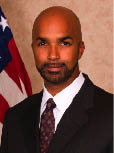Alumni News: Class Action
Carter Stewart was always interested in equity issues in education. He didn't figure on ending up as a U.S. Attorney
Carter Stewart was always interested in equity issues in education. He didn’t figure on ending up as a U.S. Attorney
By Siddhartha Mitter
“Talking to a jury is very similar to talking to a class,” says Carter M. Stewart (M.A. ’95). “You have to move them from A to B, and be persuasive and creative.”
The courtroom and the classroom have exerted a dual pull on Stewart for years. Born in Atlanta into a family of educators, he earned his master’s degree in education policy at TC while teaching at New York’s Friends Seminary. But litigation had always interested him, and he already knew then that he would go on to law school.
“I thought I would work on school financing litigation and school equity issues,” he says.
Both were emerging areas in the mid-1990s. After suits seeking equal funding for all school districts were rejected by the U.S. Supreme Court, equity litigation had shifted to the states, where some state constitutions guaranteed all children a basic standard of education. Meanwhile, years of “white flight” had made money, not race, the key issue in these arguments. “Even where integration was mandated, there was nobody left to integrate,” says Stewart, who studied these issues while at Harvard Law School. “I was interested in the next generation of cases, and I thought they would center on socioeconomic status.”
What Stewart didn’t anticipate was that his career would shoot him to an entirely different level of prominence—as U.S. Attorney for the Southern District of Ohio, a position he assumed in September 2009 after being recommended by Senator Sherrod Brown (D-Ohio) and nominated by President Obama.
“I’m still not sure how I got this job!” he says, though his qualifications were impeccable. After law school, Stewart clerked for federal judges in New York and the Virgin Islands and served as Assistant U.S. Attorney in San Jose, California. When his wife, a law professor, needed to move closer to her family in Ohio six years ago, he took a job there in private practice.
“I didn’t know a soul in Ohio,” Stewart says. “But it has worked out well.”
His duties as the top federal law enforcement officer in his district are endless, so Stewart has had to be creative to stay connected to education. He’s done so, he says, by “making preventive measures a big part of what I do”—including programs in which prosecutors talk with youth at risk and help steer them away from criminal behavior.
“Kids are growing up in rough circumstances, developing as best they can on the education front,” he says. “There are equity issues related to race, to income. And there are strong parallels there with what happens to people in the criminal justice system.”
Published Friday, May. 20, 2011
